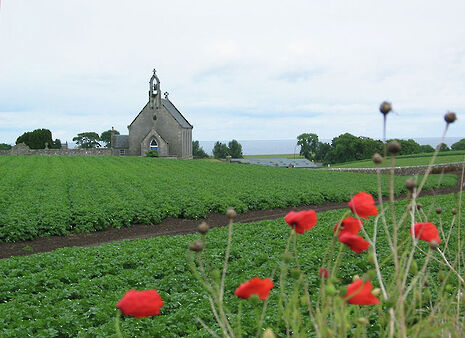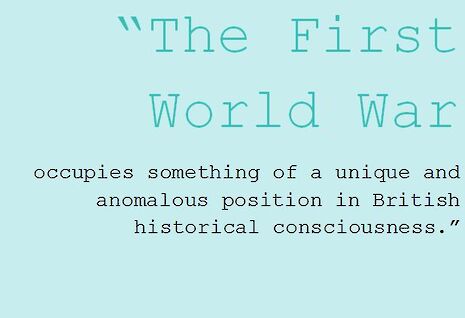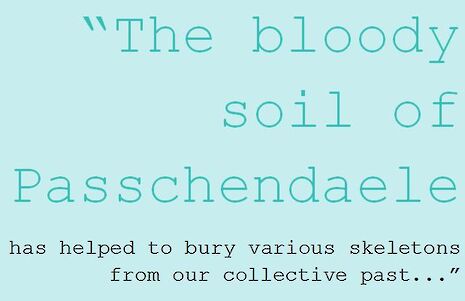We will remember them: how?
As planning begins to commemorate the First World War centenary, Louis Morris questions how we look back on the ‘not-so-Great War’.

The 100th anniversary of the First World War’s outbreak is fast approaching, and once again the battle-lines are being drawn: this time not in the Flanders mud, but in print and online as the debate escalates over how exactly the ‘war to end all wars’ should be remembered. In particular, the government’s plans for marking the centenary (announced by the Prime Minister last October) have drawn sharp criticism from both left and right. On the left, several argue that it is wrong to commemorate the beginning rather than the end of such of a destructive conflict, with Plaid Cymru MP Jonathan Edwards going so far as to accuse David Cameron of parroting the same ‘jingoistic idiocy’ that led the country into war into the first place. On the right, critics complain that the centenary plans over-emphasise British defeats and ignore victories, barely acknowledging that we won at all lest it offend the Germans.

What is undeniably true is that the First World War occupies something of a unique and anomalous position in the British historical consciousness. When we think of other military successes such as Agincourt, the Armada, the Napoleonic Wars, World War Two and the Falklands, though we may deplore the blood that had to be shed, broadly speaking we are content to accept them as national achievements we can be proud of. But despite ending in total British victory, the First World War is remembered as the worst of all wars: a hollow triumph in a meaningless quarrel, paid for with the sacrifice of a whole generation sent by selfish generals to die in the bloodbath of the Western Front. All our most visible cultural symbols of the conflict reinforce this negative view, from the sombre reflection of Armistice Day and Remembrance Sunday (now blurred together into a single ‘Poppy Day’ in the minds of most), to the pathos of Dulce et Decorum Est, to the savage satire of Blackadder Goes Forth. More gung-ho treatments, akin to the swashbuckling Sharpe series set in the Napoleonic Wars or the countless First Person Shooters which let gamers re-fight World War Two, are almost entirely absent.
Yet this damning verdict was not always so universally accepted, and historians such as Dan Todman, Gary Sheffield and Hew Strachan are trying to challenge it even now. Field Marshal Douglas Haig, reviled today as the worst of the ‘donkeys’ who led the young ‘lions’ of the British Army to the slaughter at the Somme, was seen as something of a hero in his own lifetime, and the crowds attending his funeral exceeded those at Princess Diana’s. He is now regarded by many scholars as a fairly conscientious general, more Marlborough than Melchett. Furthermore, although the casualties sustained on the Western Front were horrific, they were neither unprecedented nor insupportable; some 78% of the ‘lost generation’ made it back to Britain alive, a figure no worse than that for soldiers fighting in the Napoleonic Wars of a century earlier. And it is increasingly clear that the attitudes to the war of the majority of people at the time were far more complex than simple trauma and revulsion. On the balance of this evidence, the prevailing modern view that the First World War was nothing more than a Pyrrhic disaster seems almost as much of an “old lie” as the opposite sentiments decried so movingly by Wilfred Owen.
This being so, should we therefore heed the call of the Daily Mail and restore the First World War to its rightful place in the pantheon of Great British Victories to be celebrated? I don’t think so; to my mind, the problem is not so much that we are insufficiently proud that Britain won the Great War, but rather that we are overly proud of it winning all those others. For starters, the whole notion that we should take pride in the deeds of our ancestors seems based on questionable logic. It makes some sense to be proud of your descendants’ achievements, as by helping guide their development (or just giving them some good genes) you have been partially responsible for their success, but the same hardly applies to what your great-great-grandparents did long before you were born. Moreover, glorifying any kind of military activity with celebrations is sowing the seeds for future bloodshed, and thus the belief that we should react to victory not with flag-waving triumphalism but with solemn remembrance remains one of the most valuable legacies of the conflict of 1914-1918.

Nonetheless, in order for this ideal to be fully realised, we must first seek a more balanced reassessment of that conflict, one which takes it off its macabre pedestal of the worst of all wars. For as long as we continue to treat this war as in some way uniquely wicked and destructive, then it can be seen as a one-off, an isolated glitch in the otherwise glorious military history of our nation. The bloody soil of Passchendaele has helped to bury various skeletons from our collective past which perhaps need to be aired again, such as the more morally dubious aspects of the Second World War (notably the RAF’s ruthless firebombing of German cities for negligible strategic gain, left off curricula in favour of the far lesser horrors of the Blitz) and older atrocities (like the massacre of prisoners at Agincourt, part of a sordid war of aggression fought to replace one set of aristocrats occupying the French throne with another). With this in mind, the best way we can commemorate the centenary of the First World War is neither to celebrate nor to demonise what happened, but to begin a clear-eyed re-examination of its events and where they fit in to a broader historical narrative. By helping to bring the whole of our military past under new scrutiny, the Great War can finally take a small step towards becoming ‘the war to end all wars.’
 News / Clare Hall spent over £500k opposing busway 24 December 2025
News / Clare Hall spent over £500k opposing busway 24 December 2025 Comment / The ‘class’ of Cambridge24 December 2025
Comment / The ‘class’ of Cambridge24 December 2025 News / Caius mourns its tree-mendous loss23 December 2025
News / Caius mourns its tree-mendous loss23 December 2025 Comment / League tables do more harm than good26 December 2025
Comment / League tables do more harm than good26 December 2025 News / Girton JCR publishes open letter expressing solidarity with Palestine25 December 2025
News / Girton JCR publishes open letter expressing solidarity with Palestine25 December 2025








